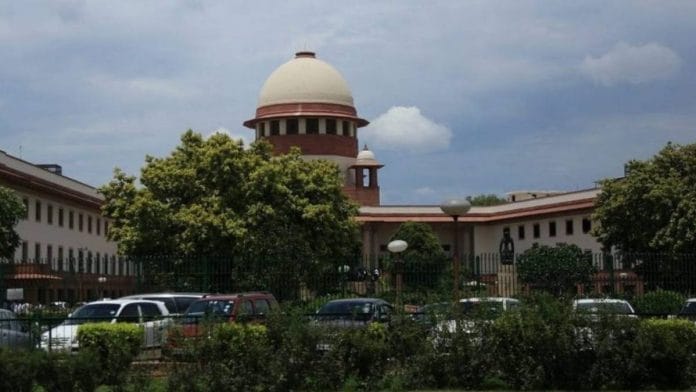New Delhi: Taking strong exception to the actions of Kerala-based YouTuber Suraj Palakaran, who got into legal trouble for revealing the identity of a child involved in a case registered under the Protection of Children from Sexual Offences (POCSO) Act, the Supreme Court Monday asked him to tender an unconditional apology for the same.
The bench of Justices Surya Kant and Joymalya Bagchi was hearing the YouTuber’s plea for quashing of criminal proceedings against him. While asking Palakaran to consider the apology, the judges also asked him to deposit some amount of money, owing to the fact that he made money from the video that disclosed the child’s identity.
The court subsequently shifted the matter for hearing to 12 December this year.
The matter originates from Palakaran’s YouTube channel True TV, which put out an investigative report on a man who allegedly tried to frame his wife under the POCSO Act, causing their son to make false allegations against her.
Attempting to highlight the woman’s story on his channel, Palakaran found himself embroiled in legal trouble for disclosing the child’s identity–an offence under Section 23 of the POCSO Act and Section 228A of the Indian Penal Code (IPC).
After this, Palakaran made his way to the Kerala High Court seeking to quash the criminal case against him under these sections but got partial relief, as the court refused to quash the POCSO Act charge but dropped the IPC charge.
Also Read: From child protection to ‘moral policing’ tool: How POCSO Act is leaving courts conflicted
Whose identity is protected under law?
The law does accord some protection to victims of sexual offences, and even children who are in conflict with the law.
Section 23 of the POCSO Act states that no person shall make any report or present comments on any child from any form of media or studio or photographic facilities without having “complete and authentic information”, which may have the effect of lowering his/her reputation or infringing upon privacy.
Apart from restricting persons from naming a child embroiled in a case under the POCSO Act, the law also bars disclosures of other important details which may lead to the discovery of the child’s identity.
“No reports in any media shall disclose the identity of a child, including his name, address, photograph, family details, school, neighbourhood or any other particulars which may lead to disclosure of identity of the child,” Section 23 states.
There are exceptions to the law, however, since if a special court gives reasons in writing that the disclosure may be in the child’s interest, it may be permitted.
Moreover, a publisher or owner of media or studio facility shall be jointly and severally liable for the acts and omissions of his employee, if an organisation does go ahead and disclose vital details of a child in a POCSO Act case.
The punishment for violating this provision is imprisonment not less than six months to one year, or fine, or both.
Besides this, Section 74 of the Juvenile Justice Act prohibits disclosure of a child’s identity and states that no newspaper, magazine, news-sheet or audio-visual media or other forms of communication can report about any inquiry, investigation or judicial procedure, which may lead to identifying a child in conflict with law, or a child who is in need of care and protection. It also bars publishing pictures of children involved in such matters. This offence comes with imprisonment up to six months, a Rs 2 lakh fine or both.
Besides children, the IPC, and now the Bharatiya Nyaya Sanhita, under Sections 228A and 72(1) also penalise disclosure of identity of a rape victim or victim of a sexual offence, with two years’ imprisonment and a fine.
Court rulings
Going as far back as 2018, a Supreme Court bench of Justices Madan Lokur and Deepak Gupta issued directions for the protection of victims of rape and sexual offences. In doing so, the court noted that no person can print or publish the name of such victims even in a remote manner, which leads to discovery of their identity.
Last year, the Supreme Court while acting in the case of Kinnori Ghosh upheld the right of anonymity and dignity, even posthumously, for victims who had passed away in such sexual offence cases, in the aftermath of the RG Kar Medical College rape and murder case.
“This court is constrained to issue an injunctive order since the social and electronic media have proceeded to publish the identity of the deceased and photographs of the body after the recovery of the body,” it had said.
In the case of Nipun Saxena vs Union of India in 2018, the top court said no one can print or publish in print, electronic or social media the names of victims (of sexual offences) or disclose their identities even in a remote manner.
Even disclosure of facts that allow a victim to be identified was forbidden by the court. For those with an unsound mind, or those victims who passed away, their names cannot be disclosed, even if their kin allow.
The court also said that police should keep all documents where victims’ names and important details are disclosed in a sealed cover as far as possible. The court further said that FIRs in rape and POCSO Act cases should not be shared publicly.
(Edited by Nida Fatima Siddiqui)
Also Read: POCSO vs teen romance: As SC reviews age of consent, NCRB data shows 9 out of 10 youth get acquitted






